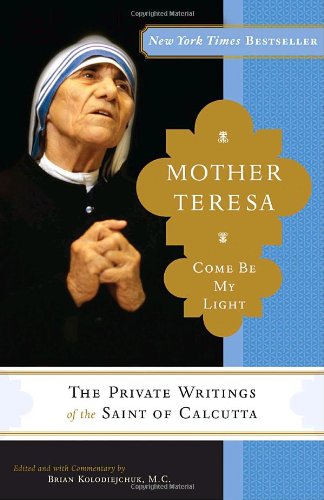Book review: Mother Teresa, The Private Writings of the “Saint of Calcutta”
by Brian Kolodiejchuk, M.C.
★★★★★
Maybe you read the story of Mother Teresa from her friends, those who served alongside her. Maybe you read it differently from her detractors, like Christopher Hitchens. Here is the story from her own hand … a brutally honest account, because she had no intention of anyone ever reading it. This is an annotated collection of her personal letters, mostly to those in authority over her in the Church. She begged repeatedly that these letters be destroyed, so that the world would never know what was in her heart as she ministered in Calcutta among the poorest of the poor. But the Church, after beautifying her as a saint, felt the letters were an important part of Catholic history. Rather than destroying them, after her death they were published in this book.
For the first time, the rest of the world was made aware of the deep darkness inside this saint. Mother Teresa had pleaded over and over with the Church to be allowed to go to India and set up a ministry there for the poor. She felt she had received direction straight from Jesus for this task, and that by being a help and comfort to them—the forsaken, the lepers, the hungry, the sick—she was sharing the love of Jesus. Years, she waited for permission, before it was granted. But almost immediately upon arrival, she began to feel a darkness in her soul. She felt no God there in India. God had abandoned her, leaving only darkness, despair, and doubt. Doubt about whether there was a heaven; doubt at times about even His existence. For nearly fifty years until her death, she struggled with darkness in her soul, painting a smile on her face so as to be an encouragement to others, while bearing the pain alone.
“The place of God in my soul is blank—There is no God in me—when the pain of longing is so great—I just long and long for God—and then it is that I feel—He does not want me—He is not there—“
Every single letter in the book, I believe, contained a plea for others to pray for her, that she could endure the darkness.
“Pray for me—for within me everything is icy cold.”
“I am told God loves me—and yet the reality of darkness & coldness & emptiness is so great that nothing touches my soul. … The whole time smiling …my cheerfulness is the cloak by which I cover the emptiness & misery.”
I get the feeling that even the book’s author, in collecting and presenting these letters, underestimated the depth of Mother Teresa’s hopelessness:
“If there be no God—there can be no soul.—If there is no soul then Jesus—You also are not true.—Heaven, what emptiness—not a single thought of Heaven enters my mind—for there is no hope. … In my heart there is no faith—no love—no trust—there is so much pain—the pain of longing, the pain of not being wanted. … I don’t pray any longer.
“If there is hell—this must be one. How terrible it is to be without God—no prayer—no faith—no love.”
The darkness never lifted. I think it was only in about the last ten years of her life that she finally made peace with it, comparing it to the darkness Jesus felt in the Garden, and on the cross. “My God, My God, why have you forsaken me?” Mother Teresa found in the darkness a “greater identification with the poor,” and in this way, lived out the rest of her life in service.












 354 Circles
354 Circles
 603 Goodreads Friends & Fans
603 Goodreads Friends & Fans

 Hello! I'm an author, historical Jesus scholar, book reviewer, and liberal Christian, which means I appreciate and attempt to exercise the humanitarian teachings of Jesus without getting hung up on any particular supernatural or religious beliefs.
The Bible is a magnificent book that has inspired and spiritually fed generations for thousands of years, and each new century seems to bring a deeper understanding of life’s purpose. This is true of not only Christianity; through the years, our age-old religions are slowly transforming from superstitious rituals into humanitarian philosophies. In short, we are growing up, and I am thrilled to be riding the wave.
I avidly read all thought-provoking religion titles. New authors: I'd love to read and review your book!
Hello! I'm an author, historical Jesus scholar, book reviewer, and liberal Christian, which means I appreciate and attempt to exercise the humanitarian teachings of Jesus without getting hung up on any particular supernatural or religious beliefs.
The Bible is a magnificent book that has inspired and spiritually fed generations for thousands of years, and each new century seems to bring a deeper understanding of life’s purpose. This is true of not only Christianity; through the years, our age-old religions are slowly transforming from superstitious rituals into humanitarian philosophies. In short, we are growing up, and I am thrilled to be riding the wave.
I avidly read all thought-provoking religion titles. New authors: I'd love to read and review your book!
 Hi! While Lee writes the articles and reviews the books, I edit, organize, and maintain the blog. The views expressed here are Lee's but I'm his biggest supporter! :-)
Hi! While Lee writes the articles and reviews the books, I edit, organize, and maintain the blog. The views expressed here are Lee's but I'm his biggest supporter! :-)
Connect With Me!